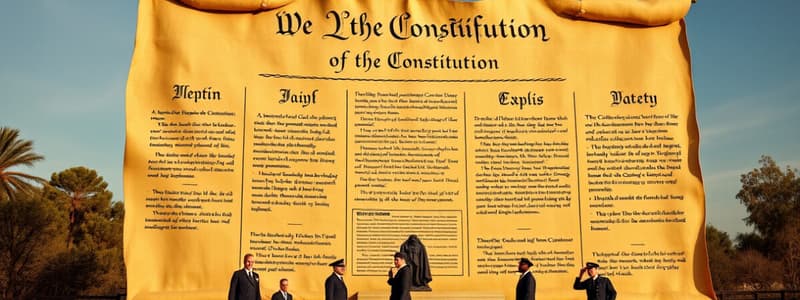Podcast
Questions and Answers
What are the Seven Principles of the Constitution?
What are the Seven Principles of the Constitution?
- Limited Government (correct)
- Socialism
- Separation of Powers (correct)
- Checks and Balances (correct)
- Republicanism (correct)
- Individual Rights (correct)
- Federalism (correct)
- Popular Sovereignty (correct)
What is Popular Sovereignty?
What is Popular Sovereignty?
The right of people to make political decisions for themselves.
What does Republicanism represent?
What does Republicanism represent?
The ability of people to vote for their political representatives.
What is Federalism?
What is Federalism?
What does Separation of Powers mean?
What does Separation of Powers mean?
What is meant by Limited Government?
What is meant by Limited Government?
Define Individual Rights.
Define Individual Rights.
What is Checks and Balances?
What is Checks and Balances?
Give an example of Popular Sovereignty.
Give an example of Popular Sovereignty.
Provide an example of Republicanism.
Provide an example of Republicanism.
Give an example of Federalism.
Give an example of Federalism.
Give an example of Separation of Powers.
Give an example of Separation of Powers.
Give an example of Checks and Balances.
Give an example of Checks and Balances.
Give an example of Limited Government.
Give an example of Limited Government.
Give an example of Individual Rights.
Give an example of Individual Rights.
Flashcards are hidden until you start studying
Study Notes
Seven Principles of the Constitution
- The Constitution is based on seven key principles: Popular Sovereignty, Republicanism, Federalism, Separation of Powers, Checks and Balances, Limited Government, and Individual Rights.
Popular Sovereignty
- Refers to the principle where the authority of the government is created and sustained by the consent of its people.
- Citizens exercise power through voting and public office participation.
Republicanism
- Involves electing representatives to make decisions on behalf of the citizens.
- Ensures that the government reflects the will of the people through democratic elections.
Federalism
- A dual system of governance where power is divided between the national and state governments.
- Each level of government has its own responsibilities and powers, allowing for a balanced distribution of authority.
Separation of Powers
- Divides government responsibilities into three branches: Legislative (creates laws), Executive (enforces laws), and Judicial (interprets laws).
- Prevents any one branch from becoming too powerful by assigning distinct functions.
Limited Government
- Establishes that all individuals and government officials are bound by law.
- Ensures that no one, regardless of their position, is above the law, promoting fairness and accountability.
Individual Rights
- Represents the fundamental freedoms and privileges guaranteed to all citizens, primarily outlined in the Bill of Rights.
- Protects personal liberties such as freedom of speech, assembly, and religion.
Checks and Balances
- A system designed to prevent any one branch from dominating the government.
- Each branch has the ability to limit the powers of the others, such as the President's veto power or Congress's ability to override that veto.
Examples of the Principles
- Popular Sovereignty: Citizens influence government actions through elections and candidacy.
- Republicanism: Voting for a president every four years exemplifies citizen representation.
- Federalism: Residents may pay both state and federal taxes, illustrating shared power.
- Separation of Powers: The Executive branch is prohibited from coining money, a power assigned to Congress.
- Checks and Balances: The President's veto can be overridden by a two-thirds congressional vote.
- Limited Government: The President is forbidden from using office for personal financial gain.
- Individual Rights: The right to remain silent during arrest is protected under the Fifth Amendment.
Studying That Suits You
Use AI to generate personalized quizzes and flashcards to suit your learning preferences.




